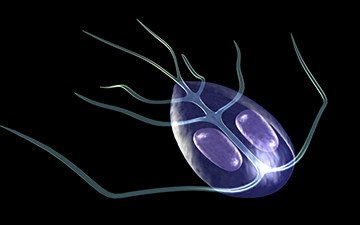Many forms of infections can harm animals and humans, the one we will be discussing today is the one that can cause diarrhea in dogs, whose name is Giardiasis, it is a common parasitic infection that is caused by an intestinal parasite known as Giardia. This parasite can be found in feces-contaminated soil, water, and even food, so when a dog ingests anyone of these infected materials, he stands a chance of being infected.

flickr.com
The entire life cycle of the parasite, "Giardia" is very simple. In the vegetative state, it inhibits the lumen of the small intestine, where they may attach to the brush border of the epithelial cells through the ventral disk, there they absorb nutrients and multiply through binary fission. They do not have any intracellular stage, the trophozoites often live in the proximal portion of the small intestine and then migrate down the intestine when there is an infection.
Transmission of the parasite could be through; the fecal-oral route, either through direct contact with an infected host contaminated with an infective cyst or through contact with a contaminated environment. Giardia is in two forms; trophozoites which exist in the intestine of an infected dog and the other is cysts which are a form of trophozoites which is protected by an outer shell. Cysts can survive in an environment for months.
The most common clinical signs of Giardiasis are; abdominal discomfort, acute or sudden diarrhea, soft or watery stool accompanied with mucus, and a foul odor. The stool is very important when it comes to Giardiasis because to diagnose the presence of the parasite, stool samples will need to be examined. A second fecal test may also be carried out, to look out for other signs. There is a possibility of having an infected dog that fails to show symptoms and signs, and this is the reason why a routine fecal check is very necessary.
The moment Giardia cysts are passed through the feces, they become ineffective in the body of the animal but survive appropriately within the environment, especially in cool and damp conditions in which these cysts could remain ineffective even for months. These cysts as a form of infection provide a chance of reinfection in animals especially when these animals exist in crowded areas. This means the form of control that should be focused on will be taking out feces as soon as possible and disposing of infectious waste, on the other hand, pets need to be bathed consistently to eliminate hair coat, and this needs to be done with the use of a recommended shampoo.
Your vet may prescribe a diet that will aid digestive health to help handle diarrhea, certain medications are also prescribed to help. Household cleaning steam-cleaning, and prompt disposal of feces are important in ensuring Giardia cysts are eliminated from the environment.
With appropriate treatment, most cases of giardiases are properly eliminated. In situations where diarrhea persists, sample stool may have to be taken to ensure there is no case of re-infection.

commons.wikimedia.org
Giardia can affect humans and other species too, but the type of giardia that infects humans is different from the type that infects dogs and cats. This means it is rare for humans to get infected from the same strain of Giardia that affects pets. Proper washing of the hands with soap and water after handling your pet is extremely necessary.
An infected dog can infect another dog who is not infected, but an infected dog cannot infect a cat as they are not vulnerable to the same strain.
When humans get infected with Giardia, it may lead to dehydration, when this happens, it is advisable to drink lots of fluid. The chances of pregnant women and infants becoming more dehydrated as a result of Giardia infection is more common and it could be life-threatening in infants, it is very important to visit your doctor whenever your infant feels sick.
Conclusion.
Symptomatic giardiasis needs to be treated timely to limit the duration of symptoms felt as well as prevent complications, and limit the transmission of parasites to other hosts.
References.
msdvetmanual.com/digestive-system
cdc.gov/parasites/giardia/prevention
Thanks for your contribution to the STEMsocial community. Feel free to join us on discord to get to know the rest of us!
Please consider delegating to the @stemsocial account (85% of the curation rewards are returned).
Thanks for including @stemsocial as a beneficiary, which gives you stronger support.